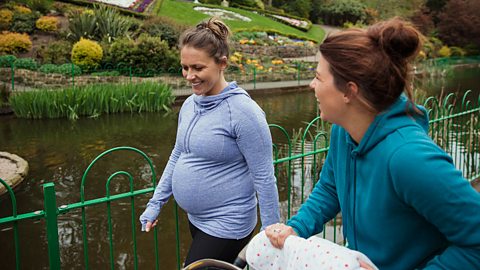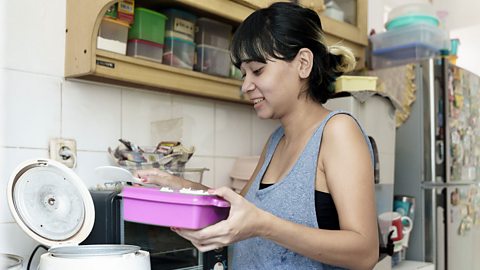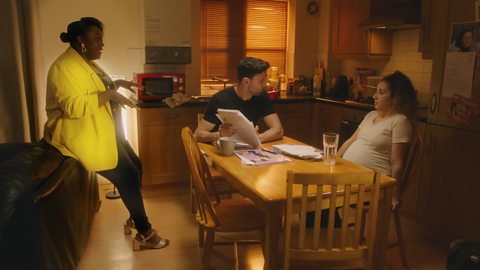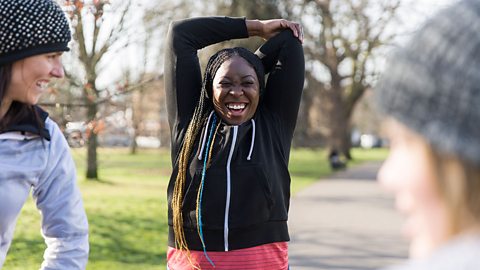Expecting not all you expected? Is it less ÔÇÿglowingÔÇÖ and more ÔÇÿgruellingÔÇÖ?
When youÔÇÖre dealing with the emotional rollercoaster of being pregnant, itÔÇÖs not unusual to feel like everythingÔÇÖs getting on top of you.
YouÔÇÖre dealing with lots of physical symptoms, changes in your life, uncertainties and worries about your baby, as well as handling everything going on at home.
It should bring you some comfort that youÔÇÖre not alone ÔÇô feeling anxious during pregnancy is very common ÔÇô and that there are plenty of ways you can help your mental wellbeing.

Tell someone how youÔÇÖre feeling
As simple as it sounds, donÔÇÖt bottle up your feelings.
It doesnÔÇÖt matter who you open up to ÔÇô online or face-to-face, your partner or a friend ÔÇô but when you do, it will feel like a weightÔÇÖs lifted.
A problem shared really is a problem halved. And you will be taking the first step to feeling better.
Find a good time and place to talk to someone ÔÇô ideally when you canÔÇÖt be distracted.
Find any root causes
Stress is a complex condition at any time, but especially so with the added highs and lows of pregnancy hormones.
This means you wonÔÇÖt always be able to unpick the causes and sort them. But if you can identify any reasons youÔÇÖre feeling the way you are ÔÇô some people find it helpful to write them down ÔÇô you might be able to deal with them and stop them spiralling.
 and ask for practical help
Think about whether someone elseÔÇÖs support could help you tackle your stresses head-on.
For example, do you have a health concern that your GP or midwife can answer, money worries or a job at home that a friend could help with?
Dealing with small niggling issues can help you feel more in control.

Get plenty of rest
Easier said than done, especially when youÔÇÖre dealing with leg cramps and heartburn ÔÇô but renewing your batteries with quality sleep can help you feel calmer.
If youÔÇÖre having trouble nodding off, give your sleep habits a health check: for example, avoid eating too late, turn off devices like phones, TVs or tablets way before your bedtime and keep your bedroom cool.
And if you tend to wake up worrying about things you need to do, keep a notepad by your bed ÔÇô sometimes the physical act of writing your tasks down can help.
DonÔÇÖt take on too much
Do you really need to repaint that room? Will your friend really mind if you donÔÇÖt go for the whole of her hen party?
Now is the time to focus on you and bonding with your bump so donÔÇÖt feel guilty about shelving things that just arenÔÇÖt important.
Stop comparing yourself
Your social media channels might be full of super-positive, stardust-sprinkled posts about the joy of pregnancy, but feeling anxious isnÔÇÖt unusual.
DonÔÇÖt get sucked into thinking everyone else is having a wonderful time ÔÇô theyÔÇÖre not. And your energy is best focused on how youÔÇÖre feeling and the things that you can control.

Eat well
When your body isnÔÇÖt getting enough good fuel, it will let you know.
Energy dips can leave you feeling extra cranky, so graze on healthy snacks like fruit, nuts and seeds and go for foods that provide slow-release energy, like oats, brown rice and wholemeal bread.
For advice on eating well, speak to your midwife and check out our healthy eating guide.
Make time to exercise
Gentle exercise is one thing you shouldnÔÇÖt side-line during pregnancy. ItÔÇÖs a mood-lifter and will help you feel physically stronger during pregnancy too. Afterwards, focus on how much better you feel for getting out.
Even a regular walk in a park has plenty of benefits and isnÔÇÖt too daunting, especially if you can get a partner to join you.
Walking not for you? For other pregnancy-friendly exercise ideas and safety advice, visit the .
Meet up with other mums-to-be
Spending time with people who understand how youÔÇÖre feeling is a guaranteed pick-me-up. But if youÔÇÖre not feeling all that sparky, it can be the last thing you feel like doing. So set yourself a small target like meeting up for short bursts.
Getting expert help
If you feel anxious most of the time and youÔÇÖre starting to worry about how youÔÇÖll cope once your baby arrives, donÔÇÖt be afraid to speak to your midwife or GP. They will have suggestions to help you feel better. For added support, you can also ask your midwife for a referral to a specialist mental health midwife.
Remember that you are not wasting anyoneÔÇÖs time by asking for help ÔÇô how you are feeling is important.
Article produced with help from Pamela Mills, an NHS midwife based in Greater Manchester.






